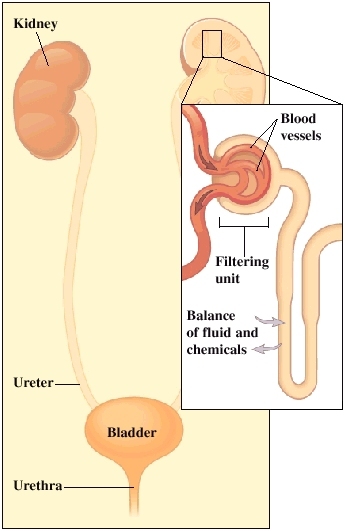Healthy Kidneys
Healthy Kidneys

Healthy kidneys clean the blood. Two normal kidneys can filter wastes and excess fluid from hundreds of pints of blood each day. This helps maintain the chemical balance the body needs to stay healthy and alive. The kidneys also carry out many other vital functions. This includes controlling blood pressure, maintaining healthy bones, and signaling the bone marrow to make red blood cells. The kidneys are bean-shaped, about the size of a fist, and located just below the rib cage near the midline of the back.
If both kidneys fail, it's called chronic kidney disease. Waste made during normal cell functions builds up in the blood (uremia). Over time, this can threaten your health. Some people are born with 1 kidney, or donate a kidney during their lifetime. People can function normally with just 1 healthy kidney, or even a part of one kidney. Some conditions that cause kidney damage include:
-
Diabetes
-
High blood pressure
-
Smoking
-
Injury
-
Immune system diseases
-
Hereditary conditions
-
Certain medicines
Removing wastes
The kidneys are part of a system that removes wastes from your body. For this system to work, the kidneys and urinary tract must do their jobs.
Vessels carry blood
Tiny blood vessels inside the kidneys carry blood to the filtering units (nephrons). These vessels also shrink or expand to control the pressure inside the kidneys.
Filters clean blood
Blood is cleaned as it passes through the nephrons. Each kidney has about 1 million nephrons. Wastes and excess fluid are taken and removed from the body in urine .The proper amounts of clean fluid and vital chemicals (salts and enzymes) are returned to the blood.
Urinary tract removes wastes
Two tubes, called the ureters, connect the kidneys with the bladder (where urine collects). When the bladder is full, the urine is passed out of the body through a tube (urethra) during urination.
Updated:
March 15, 2019
Reviewed By:
Walead Latif MD